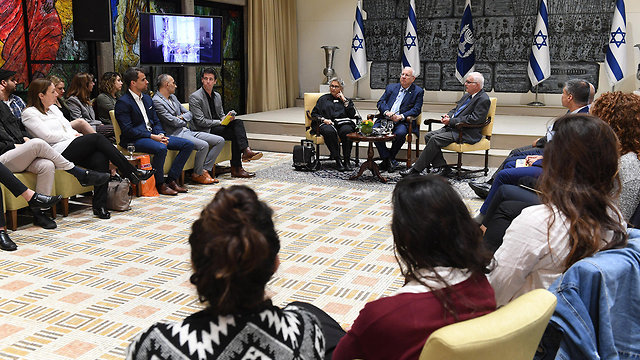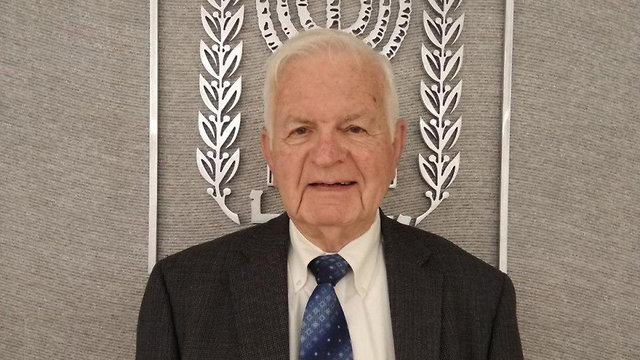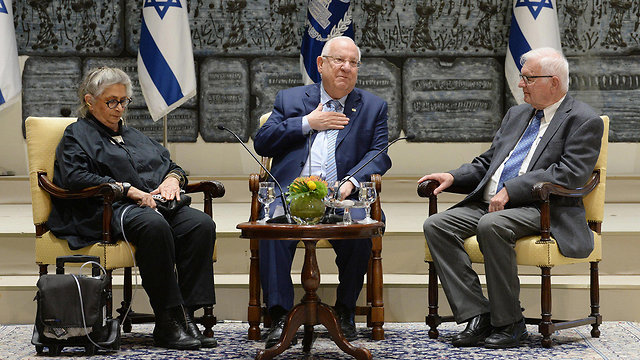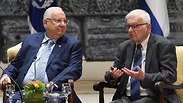
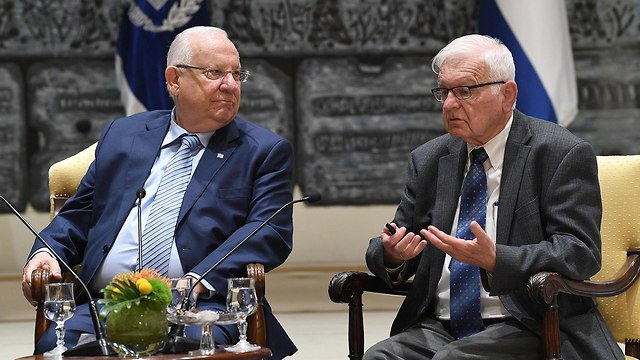
President Rivlin hosts Holocaust 'Memories in the Living Room' at President’s Residence
Memories in the Living Room, a Holocaust memorial initiative aimed at increasing participation in forming a collective memory, hosted for third straight year; survivor Noah Stern shared his personal tale of survival during the Holocaust.
President Reuven Rivlin and his wife Nechama hosted a Holocaust memorial event, “Memories in the Living Room,” at the President’s Residence in Jerusalem Tuesday.
This is the third year that the president is hosting the event. Rivlin expressed his excitement regarding the significant commemoration of the Holocaust to survivor Noah Stern, 83, who spoke about his experiences during the war.
“Memories in the Living Room” is an initiative that began eight years ago to enable people to commemorate the Holocaust within the familiar surroundings of one’s home, family and friends.
At the President’s Residence, musician Shimon Buskila performed some of his compositions for atendees.
“In two days, I will march with the army chief of staff, the Mossad and Shin Bet chief and the police commissioner at the March of the Living,” said Rivlin. “I have no doubt that you will be with us there, on the march that declares, ‘We survived, we were not saved, we survived the Shoah (Holocaust).’”
The President also said, “The same generation of Holocaust survivors who founded our country, together with those who already lived here, built a state that is marking seventy years of independence. This is such a significant event, and is perceived by the nations of the world as something to be taught and memorized and to understand why 'Never Again.' Not only because of those Jews or because of what happened to the Jews of the world during the Holocaust. Every nation and people in its own right has to investigate how people may have seen the chimneys, seen the death, saw the murders and moved on.”
Stern, a survivor, said, “When I was nine and a half, I hid with my parents in a desolate town in southeastern Slovakia. I had one older brother, Dovid, who was three years older than I. In 1942, we were forced to leave our apartment and find one closer to the Jewish community.”
Noah’s parents wanted to smuggle their son from Slovakia to Hungary in order to save him. Noah said that his brother Dovid was smuggled together with his uncle and they hid with their grandparents.
“For two years my brother lived well, he studied in Heder (religious school) and everything was fine. But one day Germany invaded Hungary and deported all (most–ed) of the Jews to Auschwitz quite rapidly. There they underwent a ‘selection’ and my brother had some short-term luck,” Noah reported.
“Dr. Mengele sent him to the right, but my grandfather took him with him saying, ‘You go with me, I cannot leave you alone.’ Cousins who survived the camp told me this. Luck was not with my brother and he was murdered at Auschwitz.”
'A nice woman took us in'
Stern was left alone with his parents and they fled to a small town in southeastern Slovakia where they were saved by a villager. Stern: “It was a tiny town, maybe 50 homes. When we arrived, a kind woman of around 55 came towards us. My father asked her if we could stay with her for a few days and she invited us in. To our surprise, there were already three Jews in the two-room house.”
Stern continued, "Dad was a chess player, he etched a chessboard for us and taught us the game. These were a few fleeting moments of happiness, playing the game together. Father was not a soldier or a youth movement member. He taught us to hide in the snow from soldiers and obtain food without ever having been trained.”
Regarding their liberation, Stern said that they heard from a family that saw a group of soldiers approaching near the village where they were hiding—a unit of opponents of the Nazi regime, proclaiming the end of the occupation.
"We waited a day and another day, and only on the third day did we set out on our journey to Hungary to hear what happened to our family. At one of the stops, father asked us to wait for him in the square. Sometime later he returned with three matzot and said, ‘Just as the Jews left Egypt with matzot, so too that is how I want to end the war.’”
Stern and his parents immigrated to Israel. His mother was in the advanced stages of pregnancy with his sister already. She was born "as a true Sabra here in Israel."
At the end of Stern's testimony, a discussion was held between the participants, who spoke about the desire to preserve the memories of the Holocaust in this generation and the importance of the "Memory in the Living Room" event, even without the testimony of a Holocaust survivor.
Yoav, a grandson of an Auschwitz survivor who died this year, said, "The commandment to remember and convey has always come from the family, but no less important is the commandment to do, to be the one who saves and does not close an eye because the atrocities have not ended… How can I save others in distress, even if they are an enemy?"
Adi Altshuler, one of the founders of Memory in the Living Room, said, "Every year the president and his wife open the Memory in the Living Room events in Israel and around the world and participate in this new tradition that is being created here, in which more than half a million hosts and guests are taking part. It was an inspiring event that highlighted the Righteous among the Nations and our duty to illuminate the good within us by good deeds, to be a light unto the nations, not to close our eyes to what is happening within us and our surroundings, to recognize our right to live in a safe and free land.”
The basic structure of the Memory in the Living evening consists of three parts: it opens with testimony, sometimes by a Holocaust survivor or from a second generation, and sometimes recorded or photographed testimony. From there they continue to an interactive session in which guests are invited to play, sing, share a personal story, or any other activity that will allow personal creative expression. The third part is an open discussion among the participants in the living room about the importance of Holocaust remembrance in the present and in our society.
The initiative is working to allow various population sectors to take a part in forming the personal and collective memory. This year, on the eve of Holocaust Memorial Day, Memory in the living room evenings will be held in social clubs and hostels for the mentally ill, boarding schools, prisons, communities of asylum seekers, dormitories and frameworks of youth at risk, people with special needs, homeless people, addiction treatment centers and many others.
It has crossed continents and already reached Jewish communities in Asia, South America, Canada, the United States, Europe as well non-Jewish communities.















